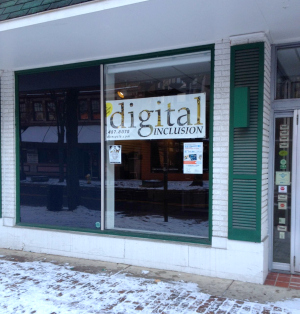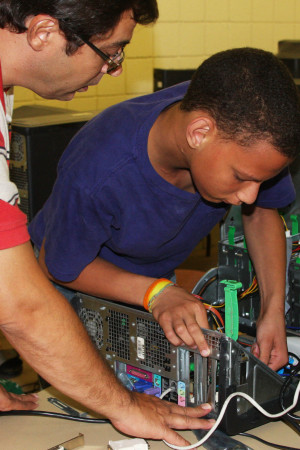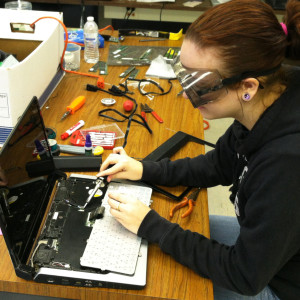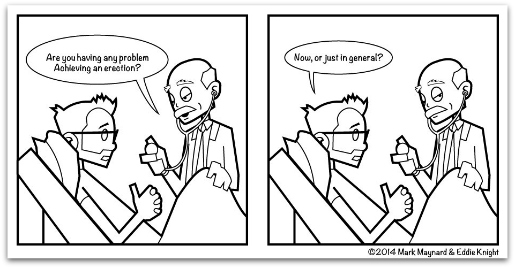There’s a new pop-up computer retailer in downtown Ypsilanti this holiday season. It’s called Digital Inclusion (DI), and it’s the most recent outgrowth of a program that started half a dozen years ago to get computer systems into the hands of folks on the wrong side of the digital divide. And, if the pop-up goes well, they may try to find a way to keep a store open downtown permanently. Not only do they sell steeply discounted, previously-owned systems to low-income and at-risk Ypsilantians, and provide low-cost to no-cost technical support, but the work of refurbishing these computers is done by local Ypsi youth under the guidance of EMU students. Following is my conversation with Jack Bidlack, the director of The B. Side, the entity that oversees the program.
 MARK: What can you tell us about Digital Inclusion?
MARK: What can you tell us about Digital Inclusion?
JACK: Digital Inclusion is a refurbished computer equipment retailer and technical training social enterprise operated by The B. Side (The Business Side of Youth). We are very excited to have just opened a pop-up storefront at 10 North Washington, in downtown Ypsilanti. The store will be open until December 17, 2014, and then we’ll evaluate what we were able to accomplish, and think about what we want to do next.
MARK: So the pop-up could lead to a more permanent presence in the community at some point?
JACK: It’s possible. We see the pop-up as a relatively safe and easy way to see what kind of impact we can have by operating a store in the community.
MARK: And it’s youth-run retail operation?
JACK: Our day-to-day store operations people, and our youth trainers, are all Eastern Michigan University students. Most of them are pursuing degrees in technology-related fields. DI provides them the opportunity to work and train (be the instructor) area youth, as well as be responsible for the success of a social enterprise developed to assisting those most in need. We have had, and are always looking for, volunteers, but a paid core student staff ensures the stability of Digital Inclusion.
MARK: So, EMU students are running DI, but the folks doing the work of restoring computers, installing software, etc, are young people from the community?
 JACK: Well, it’s a combination of both. When we’re running training programs, youth from the community provide the bulk of the work, and, when we aren’t, our EMU students do the work. No matter what, the EMU students working at DI do the final check up and approval of the computer before it can be sold.
JACK: Well, it’s a combination of both. When we’re running training programs, youth from the community provide the bulk of the work, and, when we aren’t, our EMU students do the work. No matter what, the EMU students working at DI do the final check up and approval of the computer before it can be sold.
MARK: So, on a few different levels, you’re teaching job skills, while at the same time making relatively low-cost computers, and computer support, available to members of the community who might not otherwise be able to afford it?
JACK: Yes. DI was developed to bridge the “digital divide” – the technology gap – that predominantly impacts those in low-income areas of Washtenaw County. By training youth from those areas, we’re helping to bridge that gap. During their DI training, these young people learn to repair and troubleshoot computers, which, in turn, produces functional refurbished systems. Those computers can then be sold at very affordable prices, generating money that can support our training programs, and more. We market these refurbished computers primarily to those most in need; low-income households, disabled individuals, the elderly, etc. In order to continue our work, however, we will sell to anyone.
MARK: And, these participants are also getting entrepreneurial exposure… They’re learning how to run a small business…
JACK: Right. Our hope is that going through the DI program gives these young people more options. And we’re always encouraging them in their entrepreneurial endeavors. They now have a skill and some unique knowledge. So, instead of just mowing lawns or shoveling snow, they might consider clearing up viruses and replacing hardware for people. We’ve even had youth that have purchased the refurbished computers at a discount and resold them on their own. What can we say? I mean, we’re teaching them to be entrepreneurs, right?
 MARK: Are the young people who participate compensated in any way?
MARK: Are the young people who participate compensated in any way?
JACK: Youth that go through the DI training program receive 40 to 55 hours of computer hardware and software training depending on their program track. A unique feature of the DI training program is that graduating youth also receive a $150 DI store credit. They can use this to get a complete system, or apply it to reduce the price of a more costly computer.
This is important because it impacts the youth in two ways. First, it provides them with access to a computer in their own home – helping to bridge the digital divide. And, second, it gives them a computer so that they can continue to practice what they’ve learned.
MARK: So, what can young people expect to learn when they enter the program?
JACK: The training covers both PC and MAC systems and includes the areas of: Computer Basics and Hardware, Troubleshooting, Operating Systems, Software and Updates, Security, Networking and Wireless Connectivity, Customer Service, Peer-to-Peer Training Opportunities, Community Outreach and Engagement.
MARK: What other benefits have you seen from running the program?
JACK: Through DI, we’re exposing low-income and at-risk youth to both college students and the EMU campus. We’ve seen a great number of the youth grow and come to the understanding that college is something that they’re interested in, and that they could see themselves on this campus. Many of them build lasting relationships with the EMU student trainers, who are always available through DI for follow-up questions, support and advice.
 MARK: What else can you tell me about the young people who are participating?
MARK: What else can you tell me about the young people who are participating?
JACK: As I mentioned before, the majority of the youth that go through the DI program are from low-income households, or have been designated as “at risk”. Last summer, however, we also started offering paid training courses through Washtenaw Community College (WCC), which we will offer again in the new year and next summer. These paid training courses are simply another way to reach more youth and to provide additional revenue streams to support our Digital Inclusion efforts. Ultimately, the training of youth provides an opportunity for residents of Washtenaw County to receive no-cost to low-cost technical support, and for our youth to potentially generate their own income.
MARK: How many kids can participate at any one time?
JACK: In our current space, we can have up to 16 youth in a training session. On average, we have about 8-10 per cohort, but we are often running multiple course schedules.
MARK: What was the origin of the idea?
JACK: The original vision for Digital Inclusion, also previously known as I-Zoom, came from a think tank of Washtenaw County non-profits and staff. The group applied and received a grant from the Ann Arbor Area Community Foundation (AAACF) to pilot a computer refurbishment and training program for youth. The B. Side was selected to develop, test and operate this pilot program. We launched DI on October 18, 2008. The B. Side and Washtenaw County saw a greater opportunity for success, and therefore had The B. Side take over the entire program after the first year of operation. After operating this pilot program for 2.5 years, The B. side eventually created a sustainable model and started generating enough funds to support the current program efforts. DI’s main storefront is housed on the campus of EMU in the College of Technology at 105 Sill Hall and can be reached at 734-487-8070 or at direcycle.com.
MARK: So it started as a strictly educational program, and, at some point, it was decided to add the retail component in an attempt to make the program self-sufficient, and to give the young participants experience running a business?
JACK: Yeah, kind of sort of. We knew that refurbished computers would be a byproduct of the training, and originally we knew that we could provide affordable technology to those in need, but it was important to create sustainability. Because The B. Side’s core focus is entrepreneurship, it only made sense to turn Digital Inclusion into a social enterprise – a business that has a primary mission to make a social impact through its efforts.
The business would be a major factor in creating sustainability, and, yes, provided the perfect backdrop to teach both EMU students and youth on how to develop, manage and operate a business.
MARK: Where do you get your computers from?
JACK: The vast majority of computers are donated. We look for and build relationships with organizations like EMU, Washtenaw County, Toyota Tech Center, Dominos, etc to get batch donations. Most importantly, this makes our equipment costs very low, but it also provides us with multiple systems that have the same specs and setup. This reduces the costs and confusion that can be caused by receiving single computer donations. Not that we are opposed to individual donations, but we have to be very mindful of the potential value of the donation, so typically we stick to laptops only. All donations, by the way, receive the tax benefits for donating to a 501c3 charitable organization.
MARK: So, if someone has a laptop to donate, or knows of an opportunity for a bulk corporate donation of desktop units, who should they talk with?
JACK: They can contact me directly at jbidlac1@emich.edu or call our office at 734-487-6570. We appreciate all the support we have received thus far and are always looking for new partners and supporters.
 MARK: So, what are the metrics that you point to when you tell people about the program? How many young people have gone through your training program? How many computers have been refurbished? How many have made it into the homes of those in low-income areas? And how much money have you made by way of sales?
MARK: So, what are the metrics that you point to when you tell people about the program? How many young people have gone through your training program? How many computers have been refurbished? How many have made it into the homes of those in low-income areas? And how much money have you made by way of sales?
JACK: Over the past 6 years Digital Inclusion has achieved the following:
Youth Trained: 137
EMU Students Employed: 23
# of Computers refurbished & distributed: 521
Grants, Contracts & Revenue Generated: $165,000
AND COUNTING!
MARK: And I hear that you won an award not too long ago…
JACK: Yes, we won a second place $15,000 “emerging organization” award in the Pure Michigan Social Entrepreneurship Challenge on June 18, 2013. It was good to have the validation. The competition allowed us to see how we stacked up with those creating and running other social enterprises, and proved to be a turning point for the vision of what we think DI can become.
MARK: So, you do you think you might have a permanent presence downtown?
JACK: That’s our hope. It would not only benefit the community, but EMU as well. In addition, we’re exploring how to expand the DI model to other communities throughout the state, so that we can really make an impact on bridging the digital divide.























